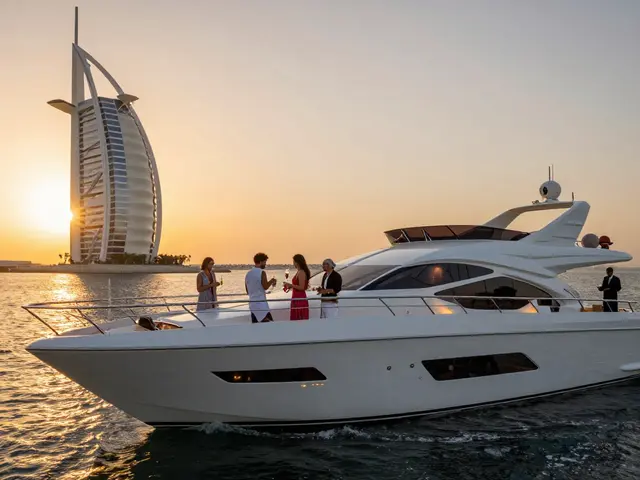- Home
- Adult Entertainment
- Dubai Escort Industry 2025: How Economic Shifts Drive Demand, Pricing, and Risk

Dubai Escort Industry 2025: How Economic Shifts Drive Demand, Pricing, and Risk
Money moves markets, and Dubai moves fast. When rents jump, currencies swing, or big events fill every hotel, the city’s shadow markets feel it. This piece breaks down how the economy reshapes demand, pricing, and risk in Dubai’s adult service ecosystem. I’m not here to tell you where to buy anything-escorting is illegal in the UAE. I’m here to help you read the signals, avoid naïve assumptions, and stay on the right side of the law while understanding the forces at play.
TL;DR
- Tourism and events are the biggest demand levers; record visitors since 2023 raised baseline demand, with spikes around major conferences and holidays.
- Costs surged: rents, hotel rates, and living expenses climbed since 2022, pushing rates up and margins tighter for anyone operating in adjacent nightlife.
- The strong US dollar (AED peg) squeezes Europeans and Brits but benefits GCC-linked spenders; currency swings re-shape who spends and when.
- Regulation and enforcement remain strict: escorting is illegal, and cybercrime rules target advertising. Legal risk is a first-order variable, not a footnote.
- For analysts: track visitor numbers (DET), hotel occupancy/ADR (STR/DET), rents (CBRE), Brent oil, DXY, and S&P Global UAE PMI to forecast peaks and dips.
What’s changing in Dubai’s economy-and why it matters
Dubai’s demand engine is global visitors plus a growing resident base. After the pandemic slump, Dubai’s Department of Economy and Tourism reported record international arrivals in 2023, surpassing 2019 peaks. Through 2024, momentum stayed strong, supported by new flight capacity, a stacked events calendar, and Dubai’s positioning as a safe, luxe playground. That means more corporate cards in the city, more expense-account dinners, and more nightlife demand.
Costs, though, raced ahead. Residential rents have been on a tear since 2022, with popular districts seeing increases well above pre-2021 levels. Hotel rates and average daily rates (ADR) jumped as occupancy climbed into the high-70s range, according to industry trackers. Add inflation in services, and every night out costs more-drivers, venues, rooms, the lot.
Policy changes add another layer. A federal corporate tax at 9% (effective mid-2023) reshapes business budgets. Visa reforms-remote worker visas, Golden Visas, multi-entry tourist options-bring more mid- to high-income residents who spend differently from weekend tourists. At the same time, legal enforcement on vice and cybercrime remains strict. That tension-high-end demand meeting hard regulation-defines Dubai’s adult-market dynamics.
Finally, the currency backdrop matters: the UAE dirham is pegged to the US dollar. When the dollar is strong, visitors paying in euros or pounds feel poorer. Russians, Indians, and Chinese visitors are affected by their own FX and capital conditions. That mix changes who spends freely and who trades down.
Demand drivers: tourism, FX, events, and corporate spend
Start with tourism. Visitor numbers set the “tide line” for the city. More visitors means more nightlife bookings, more private dining, and more general entertainment spend. The mix matters: corporate travelers behave differently to weekenders. When the calendar is heavy with trade shows, airshows, and global forums, high-end venues fill with expense accounts. Think year-end financial conferences, major tech weeks, and international sports and culture festivals. These weeks lift not just hotel rates but all kinds of discretionary spend.
Seasonality is distinct in the Gulf. Cooler months (roughly October to April) pull in leisure travelers. Ramadan typically softens late-night spending (and shifts it later into the evening), while New Year periods often spike premium demand. Long weekends in source markets can jolt arrivals.
Currency effects show up in ticket size and conversion rates. With an AED pegged to the dollar, a strong USD can make Dubai feel pricier to European and British visitors; you’ll see this reflected in shorter stays or fewer discretionary extras at the margin. By contrast, GCC residents face no FX penalty, and high oil prices tend to support Gulf wealth and travel budgets. Watch Brent crude: a sustained move higher often trickles into luxury consumption in the region within a few quarters.
Corporate budgets matter more than most people think. When global growth is steady and CFOs aren’t slashing T&E, corporate travelers spend more freely on hospitality. The S&P Global UAE PMI offers a quick pulse: readings above 50 suggest expansion. Pair that with STR data on hotel occupancy/ADR and you get a decent real-time feel for premium demand.
One more subtle driver: airlift. When airlines add capacity and new routes, that’s future demand on the runway. New long-haul routes from Europe and Asia compound Dubai’s draw and improve the arrival mix. Conversely, geopolitical disruptions can knock out source markets, reshaping the visitor tapestry overnight.

Supply-side reality: costs, migration, platforms, and enforcement
Costs are the first choke point. Residential rents, visas, transport, and everyday living have become markedly more expensive since 2022. Service providers in adjacent sectors-hostess bars, nightclubs, and entertainment marketing-see margins squeezed unless they nudge prices up or trim hours. High hotel ADRs also raise the entire night-out stack.
Migration changed the talent mix. Dubai has attracted a wave of remote professionals and entrepreneurs on long-stay visas. They have money, but they also anchor in neighborhoods with rising rents. For the gray economy, higher base costs mean fewer casual entrants and more pressure on anyone trying to operate semi-professionally. Informal markets tend to consolidate around well-capitalized players during cost surges.
Digital platforms keep shifting. Mainstream social apps tightened moderation on adult advertising; policies were toughened worldwide, and UAE cybercrime rules add teeth locally. Many accounts get flagged or removed, cutting off casual discovery. That pushes promotional attempts into riskier, less visible channels-exactly where enforcement has an easier time building cases. Advertising sexual services online in the UAE violates the law; the platform crackdown compounds legal exposure.
Enforcement is decisive. The UAE has strict laws against prostitution and trafficking, and Federal Decree-Law No. 34 of 2021 addresses online crimes, including the promotion of indecent services. The Penal Code’s morality provisions are broadly enforced. Periodic sweeps and sting operations are real. That legal risk-fines, deportation, imprisonment-dominates supply decisions far more than marginal changes in rent or FX.
Payment friction adds another constraint. Banks and payment processors de-risk adult-linked activity worldwide. In the UAE, strict AML/CFT frameworks and compliance culture make adult-adjacent transactions radioactive. Cash dependence grows in such contexts, but cash comes with security, tracing, and enforcement risks. All of this narrows viable business models and keeps the market small relative to the city’s visible luxury economy.
Pricing, margins, and scenarios for 2025-2026
When costs go up, prices tend to follow. In Dubai, higher rents, transport, and accommodation costs since 2022 increased the all-in price of a night out. Even legal entertainment venues have raised minimum spends and table rates in line with hotel ADRs and footfall. In the underground economy, prices typically move in step with hotel and chauffeur costs because those are unavoidable inputs. But price isn’t the only lever-experience length and extras compress when buyers resist headline hikes.
Three practical lenses help you think about pricing pressure without veering into operational advice:
- Input-cost pass-through: If hotel ADRs are 20-30% above a 2019 baseline in comparable periods, expect discretionary night rates to be higher too. Track ADR and you’ll anticipate shifts before they hit wallets.
- Customer mix: Corporate-heavy weeks support premium pricing; leisure-heavy periods invite price sensitivity. You’ll see this play out around major expos versus school holidays.
- Risk premium: In an environment with stringent enforcement, illegal markets carry a meaningful risk premium embedded in any price. If enforcement tightens, the premium widens even if other inputs are flat.
Now, let’s sketch scenarios. These aren’t predictions; they’re decision frames for analysts and adjacent businesses.
Base Case (2025): Visitor growth moderates but stays positive; oil sits in a stable range; the dollar remains relatively strong; rents plateau at elevated levels; enforcement steady. Expect continued high hotel occupancy in peak months and firm pricing for nightlife. Discretionary adult spend totals stay robust but concentrated in legal channels; illegal activity remains high-risk and niche.
Upside: Airlift expands faster than expected, China outbound recovers more fully, major new events land in Q4, and oil stays buoyant. Corporate travel budgets loosen. In this world, premium venues run hotter for longer, and pricing power persists across hospitality.
Downside: Global growth slows, dollar strengthens further against GBP/EUR, or a geopolitical shock crimps flights from key sources. Add tighter enforcement. Hospitality discounts appear off-peak, and discretionary spend leans defensive. The risk premium rises while demand softens-an ugly combo for anyone dabbling in illegal services.
Heuristics to keep handy:
- Watch Ramadan timing: nightlife patterns shift and late-night options thin; demand often defers rather than disappears.
- Follow ADR more than CPI: hotel rates are the leading indicator for the cost of a night out in Dubai.
- Overlay FX with your visitor mix: a 10% swing in EUR or GBP vs. USD can change conversion rates from those markets in weeks.

Compliance, ethics, and an analyst’s toolkit
First things first: escorting and prostitution are illegal in the UAE. Advertising sexual services online is illegal under UAE cybercrime laws. Human trafficking and exploitation are serious global issues, and the UAE actively prosecutes related crimes. If you’re in hospitality, marketing, or research, your duty is to comply with the law and protect people from harm. Full stop.
What can you do constructively?
- Steer demand toward legal entertainment: live shows, fine dining, beach clubs, lounges, licensed nightlife. You can deliver memorable, lawful experiences at every budget tier.
- Invest in staff training: compliance briefings on UAE laws, guest conduct policies, and escalation procedures. Document everything.
- Harden digital policies: block adult-service solicitations on your channels; moderate comments; use brand-safe ad platforms; keep legal counsel in the loop.
- Community safety: maintain clear codes of conduct; partner with reputable transport; ensure CCTV coverage and incident logging to deter predatory behavior.
Analyst’s metrics watchlist:
- Dubai Department of Economy and Tourism (DET): monthly/quarterly visitor tallies, top source markets.
- STR/DET hospitality dashboards: occupancy, ADR, RevPAR by segment.
- CBRE and Dubai Land Department: rental trends and supply pipelines.
- S&P Global UAE PMI: business activity and new orders momentum.
- Brent crude: regional wealth effect; strong oil often bolsters luxury spend.
- DXY and key FX pairs (EUR, GBP, RUB, CNY, INR vs. USD): spending power signals.
- Policy signals: visa tweaks, corporate tax guidance from the Federal Tax Authority, and law enforcement advisories.
Credible references to look up: Dubai Department of Economy and Tourism annual reports; Federal Decree-Law No. 34 of 2021 (UAE Cybercrime Law); Federal Decree-Law No. 31 of 2021 (Penal Code); Federal Tax Authority corporate tax documentation; S&P Global UAE PMI releases; CBRE Dubai Residential Market View; STR hospitality updates; and UNODC assessments on trafficking.
Comparison Table: Illegal Escorting vs. Legal Nightlife in Dubai
| Aspect | Illegal Escorting (UAE) | Legal Nightlife/Entertainment |
|---|---|---|
| Legal Status | Illegal; severe penalties under Penal Code and Cybercrime Law | Legal when licensed and compliant with regulations |
| Demand Drivers | Tourism peaks, corporate travel, high-end events; constrained by enforcement | Same macro drivers; amplified by marketing and open promotion |
| Sales Channels | Covert, high-risk; online advertising is illegal | Public, licensed venues; legal ads and partnerships |
| Pricing Power | Embedded risk premium; volatile | Tied to ADR, events, and brand; more transparent |
| Payments | High friction; AML/CFT risk | Standard POS; compliant banking |
| Key Risks | Arrest, deportation, exploitation, platform takedowns | License checks, fines for violations, reputational risk |
| Seasonality | Cool-season lift; dips around Ramadan; sensitive to crackdowns | Similar seasonality; driven by events and tourism cycles |
Checklist: Fast-read toolkit for 2025
- Is the events calendar heavy next month? Expect higher ADR and broader entertainment demand.
- Are rents stabilizing? If yes, cost pressure may ease, but at a higher plateau.
- Is DXY strong and EUR/GBP weak? Expect more value-seeking from Europeans and Brits.
- Any new visa or policy changes? Adjust compliance training and guest messaging.
- Have you audited your digital channels for illegal solicitations this week? Do it.
Mini-FAQ
- Is escorting legal in Dubai? No. Prostitution is illegal in the UAE. Advertising sexual services online is also illegal under the UAE’s cybercrime law.
- What economic metric best predicts pricing in nightlife? Hotel ADR and occupancy are strong leading indicators. When ADR climbs, total night-out costs usually follow.
- How does Ramadan affect demand? Nightlife shifts later, and some venues reduce hours. Discretionary spending often defers to the weeks after.
- Will a stronger dollar hurt demand? It can from Europe and the UK; GCC and USD-linked spenders are less affected. The mix changes even if totals stay high.
- Where can I find data? Check Dubai Department of Economy and Tourism reports, STR/DET hospitality dashboards, S&P Global UAE PMI, CBRE rental data, and Federal Tax Authority guidance.
Next steps
- Build a dashboard: DET visitors, STR ADR/occupancy, Brent oil, DXY, UAE PMI, and CBRE rents-updated monthly.
- Calendar your peaks: map major conferences, sports events, and festivals to anticipate hospitality pricing and staffing needs.
- Harden compliance: refresh staff training on UAE laws; implement strict moderation on brand channels; consult legal counsel.
- Promote legal alternatives: spotlight licensed clubs, live shows, and dining experiences tailored to source markets.
Dubai’s magnetism isn’t fading. But the rules are clear, and the costs are real. If you’re analyzing the city’s discretionary economy, anchor your view in data and law. The Dubai escort industry remains a risky, illegal sliver of a much larger hospitality story. The smarter play-ethically and commercially-is to channel demand into legal experiences while reading the same macro signals the pros use: visitors, ADR, FX, oil, and policy. That’s how you stay sharp in a city that never stops moving.

Daphne Westfield
I am an experienced escort and passionate writer who enjoys exploring the vibrant entertainment scene in Dubai. My work allows me to connect with people from diverse backgrounds while sharing insights and stories that highlight the unique lifestyle of this dazzling city. I love bringing fresh perspectives to readers who are curious about the intersection of glamour, nightlife, and luxury.
About
Discover escort UAE in our blog! Uncover the UAE’s nightlife, premium companionship, and discreet elegance with unique stories and insights. Start your journey today








